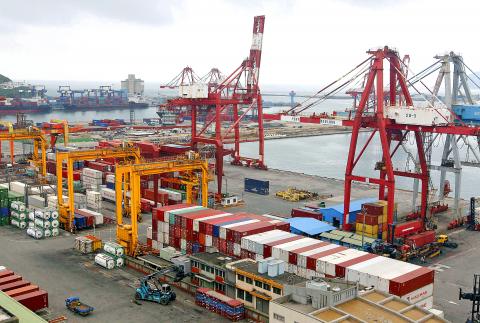The economy contracted for the first time in six years last quarter, falling 1.01 percent from the same period last year, as exports faltered due to a global slowdown and private consumption failed to lend support, the Directorate-General of Budget, Accounting and Statistics (DGBAS) said yesterday.
Despite the sharper-than-consensus-estimated decline of 0.5 percent, the nation narrowly dodged a recession — defined as two consecutive quarters of negative growth.
On a seasonally adjusted annual basis, the economy grew 0.21 percent last quarter, recovering from a 6.56 percent fall in the preceding quarter, DGBAS data showed.

Photo: Pichi Chuang, Reuters
“The economy panned out weaker than expected as both external demand and private consumption stalled,” DGBAS section chief Wang Shu-chuan (王淑娟) told a media briefing.
In August, the statistics agency forecast growth of 0.1 percent year-on-year for the third quarter.
The government will have to revise down its full-year GDP growth forecast, which the agency projected would expand 1.56 percent, Wang said.
The DGBAS is to update its GDP figures next month.
The weak GDP data dampened investor confidence, leading the TAIEX to close 0.2 percent lower at 8,554.31 points.
Exports, which drive 70 percent of the economy, declined 2.85 percent year-on-year last quarter, dragging down GDP by 2 percentage points, the DGBAS report showed.
Domestic demand failed to make up for disappointing exports, rising a mere 0.11 percent as retail sales dropped 1.93 percent from the previous year, also the first contraction since the third quarter of 2009, the report said.
Visitors to major tourist attractions dropped 8.99 percent year-on-year in July and August, and new car licenses shrank 7.88 percent last quarter, it said.
Capital formation — net additions of equipment, buildings and other intermediate goods — declined 1.25 percent last quarter from the previous year, as manufacturers cut inventories and real-estate companies shied away from new construction projects, the report said.
In terms of production, the manufacturing industry fell 3.1 percent last quarter, while the construction industry slumped 6.54 percent, the report said.
The financial and insurance sectors also experienced a soft patch, shrinking 0.51 percent from the same period last year.
Economists yesterday said the nation would remain sensitive to economic dynamics in China and the US.
Australia and New Zealand Banking Group (ANZ) expects Taiwan to benefit from increasing Chinese domestic demand and innovations originating in the US would serve as a catalyst for the local semiconductor industry, ANZ Hong Kong-based economist Raymond Yeung (楊宇霆) said.
Tony Phoo, (符銘財), Taipei-based economist at Standard Chartered Bank, said the local job market remained stable last quarter, despite weak exports, which should provide support for domestic demand.

A Ministry of Foreign Affairs official yesterday said that a delegation that visited China for an APEC meeting did not receive any kind of treatment that downgraded Taiwan’s sovereignty. Department of International Organizations Director-General Jonathan Sun (孫儉元) said that he and a group of ministry officials visited Shenzhen, China, to attend the APEC Informal Senior Officials’ Meeting last month. The trip went “smoothly and safely” for all Taiwanese delegates, as the Chinese side arranged the trip in accordance with long-standing practices, Sun said at the ministry’s weekly briefing. The Taiwanese group did not encounter any political suppression, he said. Sun made the remarks when

The Taiwanese passport ranked 33rd in a global listing of passports by convenience this month, rising three places from last month’s ranking, but matching its position in January last year. The Henley Passport Index, an international ranking of passports by the number of designations its holder can travel to without a visa, showed that the Taiwan passport enables holders to travel to 139 countries and territories without a visa. Singapore’s passport was ranked the most powerful with visa-free access to 192 destinations out of 227, according to the index published on Tuesday by UK-based migration investment consultancy firm Henley and Partners. Japan’s and

BROAD AGREEMENT: The two are nearing a trade deal to reduce Taiwan’s tariff to 15% and a commitment for TSMC to build five more fabs, a ‘New York Times’ report said Taiwan and the US have reached a broad consensus on a trade deal, the Executive Yuan’s Office of Trade Negotiations said yesterday, after a report said that Washington is set to reduce Taiwan’s tariff rate to 15 percent. The New York Times on Monday reported that the two nations are nearing a trade deal to reduce Taiwan’s tariff rate to 15 percent and commit Taiwan Semiconductor Manufacturing Co (TSMC, 台積電) to building at least five more facilities in the US. “The agreement, which has been under negotiation for months, is being legally scrubbed and could be announced this month,” the paper said,

MIXED SOURCING: While Taiwan is expanding domestic production, it also sources munitions overseas, as some, like M855 rounds, are cheaper than locally made ones Taiwan and the US plan to jointly produce 155mm artillery shells, as the munition is in high demand due to the Ukraine-Russia war and should be useful in Taiwan’s self-defense, Armaments Bureau Director-General Lieutenant General Lin Wen-hsiang (林文祥) told lawmakers in Taipei yesterday. Lin was responding to questions about Taiwan’s partnership with allies in producing munitions at a meeting of the legislature’s Foreign Affairs and National Defense Committee. Given the intense demand for 155mm artillery shells in Ukraine’s defense against the Russian invasion, and in light of Taiwan’s own defensive needs, Taipei and Washington plan to jointly produce 155mm shells, said Lin,